|
Local contingency attends Washington March for
Women’s Lives
photos and story by Laurie Dickson
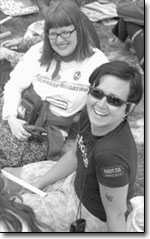 |
Twenty-one-year-old Kyle
Conrad, a sociology major at Fort Lewis College, left, and
Joelle Riddle, Planned Parenthood Education
Program manager, right, take a break from marching. "This
goes deeper than a woman's right to choose - it's about
access to birth control and education as well," said
Conrad. |
On April 25, roughly 1 million participants from around the globe
marched in what will go down in the record books as the largest
protest in the history of Washington, D.C. A Durango constituency
consisting of about 30 men, women and children added to the nearly
1,000 Colorado participants in the march. For many, marching for
women's rights has spanned generations and included marches from
the '70s through the present.
The group from Durango included students, mortgage brokers, husbands,
Democrats, Republicans, developers, Catholics, Jews and concerned
citizens. The march was sponsored by many organizations including
the American Civil Liberties Union, the Black Women's Health Imperative,
the Feminist Majority, the National Latina Institute for Reproductive
Health, National Organization of Women and Planned Parenthood
Federation of America. Common themes amongst marchers and speakers
included protecting a woman's right to choose, promoting sex education
and removing the "Global Gag" rule, which was reinstated
by President Bush on his second day in office and stopped funding
for international family planning. One of the most important messages
of the day was getting everyone to vote this coming Election Day.
Congressmen, congresswomen, celebrities and representatives of
organizations and religions provided the fodder for marching on
to the elections. Speakers included activist and Ms. magazine
founder, Gloria Steinem; presidential candidate Carol Mosely Brown;
Secretary of State Madeline Albright; and actresses Susan Sarandon,
Cybil Sheppard, Kathleen Turner and Ashley Judd. Addressing not
just issues about women, many spoke of fundamental freedoms and
human rights presently being challenged. When former First Lady
and Sen. Hillary Rodham Clinton, D-N.Y., spoke, cheers and cries
arose from the crowd as she implored marchers to continue their
activism beyond the march.
"If all we do is march today, that will not change the direction
the way the country is headed under the current administration,"
she said.
|
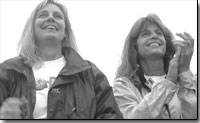
Friends Cynthia Roebuck, left, and Lynn
Greco listen to speakers during the
march. Said Roebuck, "I felt strongly about the issues
and it concerns me
greatly that my daughter may not have the same right to
choose that my
generation fought so hard to attain.” Greco reflected,
"The march
brought home a feeling of empowerment and a connection to
thousands of others who feel the same the same way I do.
It gave me hope." |
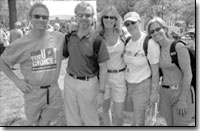
Durangoans Mark and Sharon Stetz, second
and third from right, stand among friends at the March on
April 25. Sharon said she marched to "speak for women
in the world who can't speak for themselves." Mark
said he marched to support his wife and show solidarity
for women's issues.
|
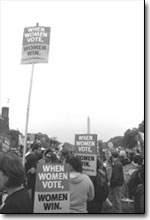
A popular message among marchers
was to get out the vote.
|

Seminal women’s rights activist
Gloria Steinem addresses the
crowd of 1 million marchers.
|
|
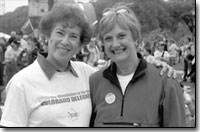
Durangoan Enid Brodsky (left) stands with
a friend during the march. "We have to do something
as women's rights
are eroding," said Brodsky of her reason for attending.
"I've never been more unhappy with our government's
stand on women's issues than now." |
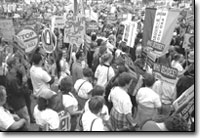
Local marchers file past amidst the
more than 1 million who participated
in the March for Women’s Lives in
Washington, D.C., on April 25.
|
|

